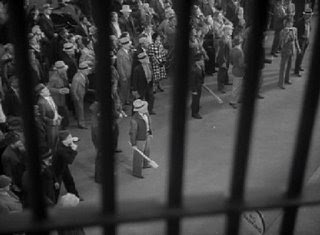Fury, by Fritz Lang (1936)
Like "Holiday," Fritz Lang's first American film is an astonishing document of the 1930s, a glimpse into a completely different political and cultural reality that reminds us of how radical even Hollywood could be.
It is a film that leaves us with an unrefuted speech by Spencer Tracy that strongly suggests that the United States is not only not the exceptionalist beacon for world freedom it presumes it is, but may also be proto- or crypto-fascistic (start at about the 5:24 mark here). It is a film that throws down hard numbers about lynching in the United States, and, while not linking these actions to race (in fact, mostly avoiding that question altogether), confronts the audience directly with the fact that very few lynchings were ever brought to trial, blocked from the courts by the complicit silence of the community (start at about the 6:45 mark here). It is a film that presents with considerable force the traumatic effects of repressing the memories of violence, of trying to bury the past. It's generally described as a film condemning "mob justice," but that's a euphemism that the film doesn't play around with. The word "lynching" is repeated over and over again, and it is repeatedly pointed out that lynching is an act of first-degree murder.
There is a question of whether the film retreats from these positions at the very last moment; it probably does, but I feel that Lang's withdrawal from the full force of his accusation is very much like the attorney's ploy of saying something or implying something which she knows will be objected to and "stricken from the record." Striking it from the record does not strike it from the memories of the jury, or of the audience. Too much is said in the film that cannot be forgotten; the saccharine ending is not able to overcome the indictment already made.
Wikipedia gives a fairly succinct description of the plot; the film is on YouTube in its entirety.
It is a film that leaves us with an unrefuted speech by Spencer Tracy that strongly suggests that the United States is not only not the exceptionalist beacon for world freedom it presumes it is, but may also be proto- or crypto-fascistic (start at about the 5:24 mark here). It is a film that throws down hard numbers about lynching in the United States, and, while not linking these actions to race (in fact, mostly avoiding that question altogether), confronts the audience directly with the fact that very few lynchings were ever brought to trial, blocked from the courts by the complicit silence of the community (start at about the 6:45 mark here). It is a film that presents with considerable force the traumatic effects of repressing the memories of violence, of trying to bury the past. It's generally described as a film condemning "mob justice," but that's a euphemism that the film doesn't play around with. The word "lynching" is repeated over and over again, and it is repeatedly pointed out that lynching is an act of first-degree murder.
There is a question of whether the film retreats from these positions at the very last moment; it probably does, but I feel that Lang's withdrawal from the full force of his accusation is very much like the attorney's ploy of saying something or implying something which she knows will be objected to and "stricken from the record." Striking it from the record does not strike it from the memories of the jury, or of the audience. Too much is said in the film that cannot be forgotten; the saccharine ending is not able to overcome the indictment already made.
Wikipedia gives a fairly succinct description of the plot; the film is on YouTube in its entirety.

Comments